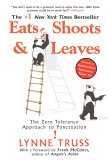Summary | Excerpt | Reviews | Beyond the Book | Readalikes | Genres & Themes | Author Bio

Critics' Opinion:
Readers' Opinion:
First Published:
Apr 2004, 240 pages
Paperback:
Apr 2006, 240 pages
 Book Reviewed by:
Book Reviewed by:
BookBrowse Review Team
Buy This Book
On the other hand, I'm well aware there is little profit in asking for sympathy for sticklers. We are not the easiest people to feel sorry for. We refuse to patronise any shop with checkouts for "eight items or less" (because it should be "fewer"), and we got very worked up after 9/11 not because of Osama bin-Laden but because people on the radio kept saying "enormity" when they meant "magnitude", and we really hate that. When we hear the construction "Mr Blair was stood" (instead of "standing") we suck our teeth with annoyance, and when words such as "phenomena", "media" or "cherubim" are treated as singular ("The media says it was quite a phenomena looking at those cherubims"), some of us cannot suppress actual screams. Sticklers never read a book without a pencil at hand, to correct the typographical errors. In short, we are unattractive know-all obsessives who get things out of proportion and are in continual peril of being disowned by our exasperated families.
I know precisely when my own damned stickler personality started to get the better of me. In the autumn of 2002, I was making a series of programmes about punctuation for Radio 4 called Cutting a Dash. My producer invited John Richards of the Apostrophe Protection Society to come and talk to us. At that time, I was quite tickled by the idea of an Apostrophe Protection Society, on whose website could be found photographic examples of ungrammatical signs such as "The judges decision is final" and "No dog's". We took Mr Richards on a trip down Berwick Street Market to record his reaction to some greengrocers' punctuation ("Potatoe's" and so on), and then sat down for a chat about how exactly one goes about protecting a conventional printer's mark that, through no fault of its own, seems to be terminally flailing in a welter of confusion.
What the APS does is write courteous letters, he said. A typical letter would explain the correct use of the apostrophe, and express the gentle wish that, should the offending "BOB,S PETS" sign (with a comma) be replaced one day, this well-meant guidance might be borne in mind. It was at this point that I felt a profound and unignorable stirring. It was the awakening of my Inner Stickler. "But that's not enough!" I said. Suddenly I was a-buzz with ideas. What about issuing stickers printed with the words "This apostrophe is not necessary"? What about telling people to shin up ladders at dead of night with an apostrophe-shaped stencil and a tin of paint? Why did the Apostrophe Protection Society not have a militant wing? Could I start one? Where do you get balaclavas?
Punctuation has been defined many ways. Some grammarians use the analogy of stitching: punctuation as the basting that holds the fabric of language in shape. Another writer tells us that punctuation marks are the traffic signals of language: they tell us to slow down, notice this, take a detour, and stop. I have even seen a rather fanciful reference to the full stop and comma as "the invisible servants in fairy tales – the ones who bring glasses of water and pillows, not storms of weather or love". But best of all, I think, is the simple advice given by the style book of a national newspaper: that punctuation is "a courtesy designed to help readers to understand a story without stumbling".
Isn't the analogy with good manners perfect? Truly good manners are invisible: they ease the way for others, without drawing attention to themselves. It is no accident that the word "punctilious" ("attentive to formality or etiquette") comes from the same original root word as punctuation. As we shall see, the practice of "pointing" our writing has always been offered in a spirit of helpfulness, to underline meaning and prevent awkward misunderstandings between writer and reader. In 1644 a schoolmaster from Southwark, Richard Hodges, wrote in his The English Primrose that "great care ought to be had in writing, for the due observing of points: for, the neglect thereof will pervert the sense", and he quoted as an example, "My Son, if sinners intise [entice] thee consent thou, not refraining thy foot from their way." Imagine the difference to the sense, he says, if you place the comma after the word "not": "My Son, if sinners intise thee consent thou not, refraining thy foot from their way." This was the 1644 equivalent of Ronnie Barker in Porridge, reading the sign-off from a fellow lag's letter from home, "Now I must go and get on my lover", and then pretending to notice a comma, so hastily changing it to, "Now I must go and get on, my lover."
Reprinted from Eats, Shoots & Leaves by Lynne Truss by permission of Gotham Books, a member of Penguin Group (USA) Inc. Copyright © Lynne Truss, 2003. All rights reserved. This excerpt, or any parts thereof, may not be reproduced without permission.





The House on Biscayne Bay
by Chanel Cleeton
As death stalks a gothic mansion in Miami, the lives of two women intertwine as the past and present collide.

The Flower Sisters
by Michelle Collins Anderson
From the new Fannie Flagg of the Ozarks, a richly-woven story of family, forgiveness, and reinvention.

The Funeral Cryer by Wenyan Lu
Debut novelist Wenyan Lu brings us this witty yet profound story about one woman's midlife reawakening in contemporary rural China.
Your guide toexceptional books
BookBrowse seeks out and recommends the best in contemporary fiction and nonfiction—books that not only engage and entertain but also deepen our understanding of ourselves and the world around us.